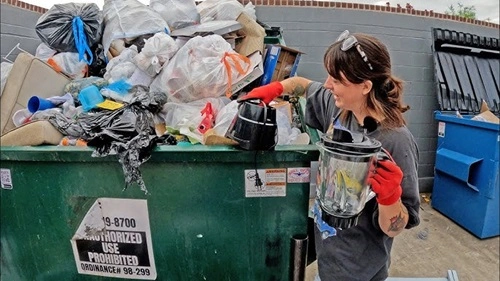No, dumpster diving is not inherently illegal in Kentucky, but it can become illegal depending on circumstances such as trespassing, theft, or violating local ordinances. While scavenging through trash is not specifically outlawed, the legality hinges on property rights, location, and how the activity is conducted.
Understanding Dumpster Diving Laws in Kentucky
Dumpster diving refers to the act of retrieving discarded items from dumpsters or trash bins. While federal law does not explicitly address the legality of dumpster diving, state laws and local ordinances govern its practice. In Kentucky, several legal considerations come into play, making the act legal or illegal depending on specific factors.
1. Relevant Legal Considerations
Ownership of Trash
The 1988 Supreme Court ruling in California v. Greenwood established that once trash is placed on public property, it is generally considered abandoned and no longer protected by privacy laws. However, this ruling does not override property rights. In Kentucky:
- Trash in public areas (e.g., curbs for municipal pickup) is generally fair game for dumpster divers.
- Trash in dumpsters located on private property (e.g., behind stores or within gated areas) is still considered part of the owner’s property until collected by waste management.
Trespassing Laws
Trespassing is one of the most common legal issues associated with dumpster diving.
- Under Kentucky Revised Statutes § 511.060, trespassing occurs when someone knowingly enters or remains on another person’s property without permission.
- If a dumpster is located on private property, such as behind a locked fence or within a restricted area, entering the property to access the dumpster is considered trespassing.
Theft Laws
Although discarded items are often considered abandoned, businesses may still retain ownership rights until waste collection. Taking items without permission could be viewed as theft in certain circumstances.
- Example: If a business intends to recycle or donate discarded items, removing them from the dumpster may result in theft charges.
Littering and Public Health Laws
Dumpster diving can sometimes lead to littering if items are scattered or improperly handled. Many cities in Kentucky have ordinances to prevent the creation of public nuisances or health hazards.
2. Locations Where Dumpster Diving May Be Restricted
Commercial Areas
Most commercial dumpsters are located on private property, making unauthorized access a potential trespassing violation. Businesses often have “No Trespassing” signs posted, which further reinforces legal protections.
Residential Areas
Dumpster diving in residential neighborhoods may be less regulated, but entering driveways or fenced areas without permission is considered trespassing.
Public Dumpsters
Public dumpsters located in parks or on municipal property are typically accessible, provided there are no local ordinances explicitly prohibiting scavenging.
3. Penalties for Illegal Dumpster Diving
Dumpster diving can lead to legal consequences if it violates property laws or local ordinances. Common penalties include:
1. Fines: Trespassing fines in Kentucky range from $50 to $250 for first-time offenses.
2. Misdemeanor Charges: Repeated violations or theft-related charges can escalate to misdemeanors, which may result in higher fines or community service.
3. Warnings or Arrests: Law enforcement may issue warnings for first-time offenders, but more severe cases can lead to arrests, especially if property damage or theft is involved.
Legal Tips for Dumpster Diving in Kentucky
To avoid legal issues while dumpster diving, follow these guidelines:
1. Stay on Public Property: Ensure the dumpster is not located behind fences, gates, or marked with “No Trespassing” signs.
2. Ask for Permission: Seek explicit permission from property owners or businesses before scavenging.
3. Check Local Ordinances: Some cities or counties may have specific rules regarding waste scavenging or public nuisances.
4. Avoid Creating a Mess: Do not scatter trash or leave items outside the dumpster, as this could lead to littering charges.
Recent Legal Updates (2023-2024)
1. Stricter Enforcement of Trespassing Laws
Cities such as Louisville and Lexington have ramped up enforcement against trespassing near commercial areas following complaints from businesses about unauthorized dumpster use.
2. Food Waste Reduction Initiatives
Kentucky has implemented programs encouraging businesses to donate surplus food rather than discarding it, potentially reducing the volume of usable items in dumpsters.
3. Public Education Campaigns
Municipalities are promoting responsible waste disposal and recycling to discourage dumpster diving and minimize associated public health risks.
FAQs About Dumpster Diving in Kentucky
1. Is dumpster diving legal in Kentucky?
Ans: Yes, dumpster diving is legal as long as it does not involve trespassing, theft, or violating local ordinances.
2. Can I dive into dumpsters behind stores?
Ans: No, dumpsters on private property, such as behind stores or within gated areas, are generally off-limits without permission and could lead to trespassing charges.
3. What are the penalties for illegal dumpster diving in Kentucky?
Ans: Penalties can include fines, misdemeanor charges, or arrest, depending on the severity of the offense and whether other laws, such as theft or littering, are violated.
4. Are there public dumpsters where diving is allowed?
Ans: Yes, dumpsters located in public spaces, such as parks or municipal areas, may be accessible for scavenging, but always check local rules.
5. How can I legally obtain discarded items?
Ans: Consider contacting businesses directly to inquire about donation programs or requesting permission to access discarded items.

